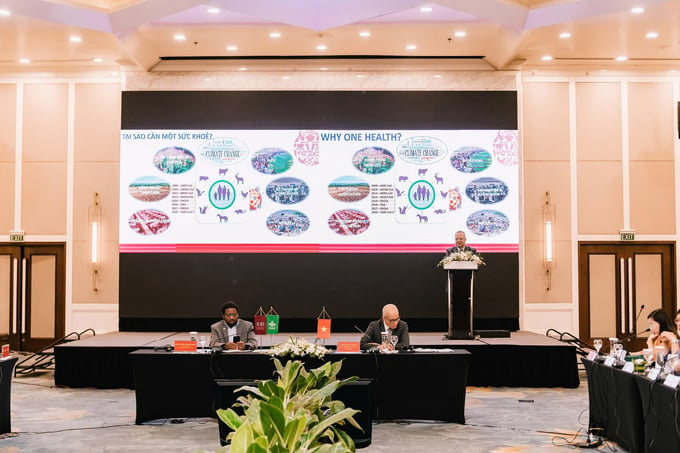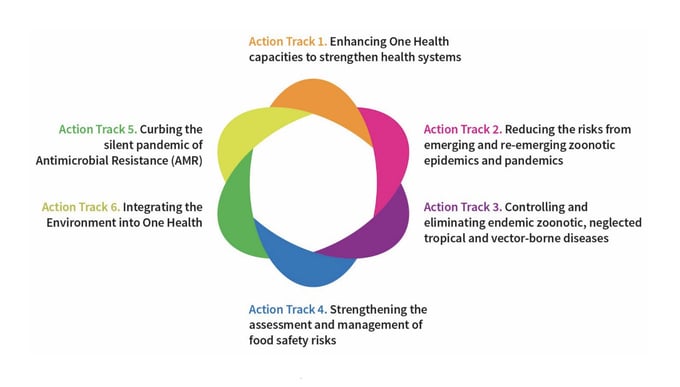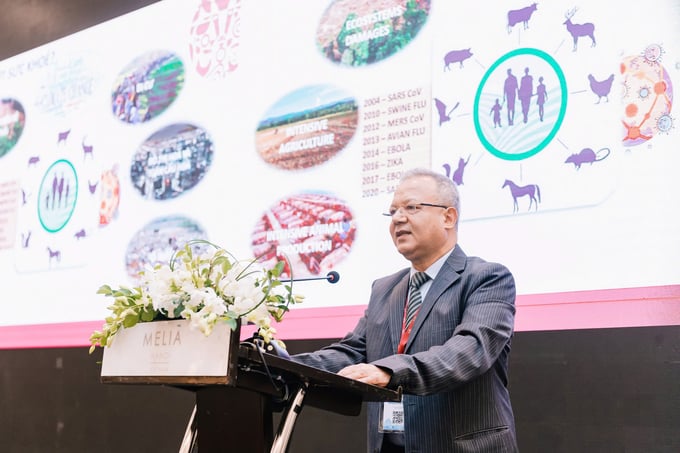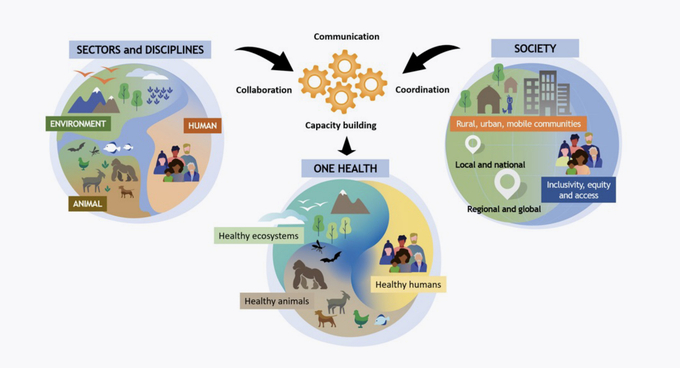June 19, 2025 | 23:28 GMT +7
June 19, 2025 | 23:28 GMT +7
Hotline: 0913.378.918
June 19, 2025 | 23:28 GMT +7
Hotline: 0913.378.918
The International One Health Scientific Conference: International Practices and Lessons Learned for Vietnam was led by the Ministry of Agriculture and Rural Development (MARD) and the International Livestock Research Institute (ILRI) on October 16th. Vietnam Agriculture Newspaper interviewed Dr. Gyanendra Gongal – Coordinator of Asia Pacific Quadripartite for One Health Secretariat.
The Quadripartite defines One Health as an integrated, unifying approach that aims to sustainably balance and optimize the health of people, animals and ecosystems. It recognizes the health of humans, domestic and wild animals, plants, and the wider environment (including ecosystems) are closely linked and inter-dependent.

Dr. Gyanendra Gongal, Coordinator of Asia Pacific Quadripartite for One Health Secretariat, spoke at the One Health Scientific Conference on October 16th. Photo: Tung Dinh.
VAN: How do global initiatives under the Global Quadripartite One Health framework support efforts to implement One Health initiatives in Vietnam? What are the biggest priorities as you move forward?
Dr. Gongal: The Global Quadripartite One Health Group comprises four international organizations: the Food and Agriculture Organization of the United Nations (FAO), the United Nations Environment Programme (UNEP), the World Health Organization (WHO), and the World Organisation for Animal Health (WOAH). One Health emphasizes multi-sectoral coordination and collaboration – an essential approach across various areas such as food safety, antimicrobial resistance, climate change, and environmental health.
This group develops policies, strategies, and action plans to advocate for and implement One Health principles at the national level, with a particular focus on low- and middle-income countries in Asia, Africa, Europe, and Latin America.
A key outcome of this collaboration is the One Health Joint Plan of Action, which provides guidance across six action tracks. It’s important to clarify that One Health is not just about zoonotic diseases. Many people still equate One Health solely with zoonoses, but it goes beyond that.

The One Health Joint Plan of Action (OH JPA) is designed to create sustainable and holistic solutions to better manage threats to the health of humans, animals, plants, and the environment and prevent potential future pandemics.
For One Health to succeed, multiple ministries and sectors must work together. We are supporting countries, including Vietnam, in implementing the One Health Joint Plan of Action. To ensure comprehensive engagement, we have introduced operational tools like joint risk assessments and national IHR-PVS bridging workshops. These tools promote surveillance, information sharing, and coordinated responses to emerging infectious diseases, including zoonoses and food safety threats.
Food safety, in particular, is crucial. Since we eat multiple times a day, the potential risk of foodborne diseases is ever-present if our food systems are not properly managed. That’s why countries need to strengthen their surveillance and coordination mechanisms.
I want to emphasize the importance of animal feed in the One Health framework. If the quality of animal feed is compromised, it affects the safety of animal products like milk, meat, and eggs, which directly impacts public health.
In the Asia-Pacific region, we have the Asia-Pacific Quadripartite One Health Secretariat, led by the WHO. We also actively support the ASEAN One Health Initiative, which includes Vietnam. Recently, we reached an agreement with the UK to implement a project supporting both the ASEAN initiative and the broader Asia-Pacific region. This is crucial because the region is a known hotspot for emerging infectious diseases, such as SARS and Nipah virus.
We need to be prepared for future outbreaks, including what we refer to as “Disease X”, referring to a potential unknown disease with the capacity to cause a pandemic. While we don’t know when or where it will emerge, preparedness is essential to minimize response costs and save lives.
I am particularly pleased to be in Vietnam, as it is one of the few countries in Asia with a strong political commitment to One Health. As part of the Quadripartite and with the support of international partners, we are working closely with Vietnam to implement the One Health Joint Plan of Action and enhance its readiness to respond to future challenges.

Dr. Gyanendra Gongal presented the Quadripartite One Health Initiatives their its global and regional perspectives. Photo: Tung Dinh.
VAN: You previously mentioned the need for a holistic approach to address these challenges. Can you elaborate on how the four Quadripartite members support your member states both individually and collaboratively?
Dr. Gongal: Climate change is one of the most pressing emerging threats, affecting every aspect of our lives. In Vietnam, for instance, recent typhoons are evidence of how the frequency and intensity of extreme weather events are increasing compared to the past. These events disrupt economies, impact livelihoods, and strain public health systems.
Each member of the Quadripartite contributes to tackling these issues based on their expertise. The UNEP specializes in environmental protection and climate change risk mitigation, helping countries reduce the impacts of climate change. WHO ensures public health preparedness, particularly in disease surveillance and pandemic response.
FAO focuses on sustainable agriculture, food safety, and minimizing risks associated with animal production. WOAH plays a vital role in monitoring and controlling animal diseases, which is crucial for preventing zoonotic outbreaks.
Climate change is something we cannot prevent. We must be prepared to face its challenges through risk mitigation. UNEP has developed policies to address the three planetary crises: biodiversity loss, pollution, and climate change.

One Health promotes a sustainable and healthy future through collaboration, communication, coordination and capacity building.
As you may know, air pollution is a significant issue in Southeast Asia. In some areas, forest fires not only affect the country of origin but also impact neighboring countries, creating a transboundary environmental problem. In response, UNEP and WHO have established a regional forum on health and environment. Recently, we expanded the scope of this forum, now known as the Asia-Pacific Platform on Health and Environment, which adopts the One Health approach.
We are pleased that our member states have embraced the idea of integrating environmental health into the One Health framework. UNEP and WHO, along with the rest of the Quadripartite organizations, are supporting these efforts both individually and collaboratively. Additionally, the ASEAN Centre for Biodiversity plays a critical role in promoting biodiversity conservation, and we are working closely with them to advance these goals.
Climate change affects everyone and every sector, so multi-sectoral coordination is essential. It impacts not only weather conditions but also food safety, food security, livelihoods, and the health of both humans and animals. Our challenge is to ensure that all sectors are actively engaged in addressing climate change and its far-reaching effects.
One Health Joint Plan of Action (2022–2026)
The OH JPA is built around six interdependent action tracks that collectively contribute to achieving sustainable health and food systems, reduced global health threats and improved ecosystem management:
Action track 1: Enhancing One Health capacities to strengthen health systems
Action track 2: Reducing the risks from emerging and re-emerging zoonotic epidemics and pandemics
Action track 3: Controlling and eliminating endemic zoonotic, neglected tropical and vector-borne diseases
Action track 4: Strengthening the assessment, management and communication of food safety risks
Action track 5: Curbing the silent pandemic of AMR
Action track 6: Integrating the environment into One Health
![Turning wind and rain into action: [9] Digitizing hydrometeorological data in response to climate change](https://t.ex-cdn.com/nongnghiepmoitruong.vn/608w/files/news/2025/06/17/z6704423696987_15fd32ffc26d590d204d520c9dac6786-nongnghiep-165943.jpg)
(VAN) Farmers have begun accessing hydrometeorological applications to adjust their cropping schedules, aiming to ensure productivity and adapt to climate change.
![Turning wind and rain into action: [8] Real-time salinity detection and early warning technology](https://t.ex-cdn.com/nongnghiepmoitruong.vn/608w/files/news/2025/06/17/z6704423696987_15fd32ffc26d590d204d520c9dac6786-nongnghiep-151127.jpg)
(VAN) Thanks to the integration of modern hydrological-hydraulic models, remote sensing technologies, and artificial intelligence, the accuracy of hydrological forecasting has significantly improved.
![Turning wind and rain into action: [7] Early disaster warnings help marine farmers minimize losses](https://t.ex-cdn.com/nongnghiepmoitruong.vn/608w/files/news/2025/06/17/z6704423696987_15fd32ffc26d590d204d520c9dac6786-nongnghiep-142942.jpg)
(VAN) In recent years, thanks to early disaster warnings and forecasting, marine farmers in Khanh Hoa province have been able to reduce risks and losses, thereby improving production efficiency.
![Turning wind and rain into action: [6] ‘Four on-the-spot’ disaster management software](https://t.ex-cdn.com/nongnghiepmoitruong.vn/608w/files/news/2025/06/17/e5a48259d6a262fc3bb3-nongnghiep-183800.jpg)
(VAN) By simply activating the scenario on the disaster management software, the relevant authorities immediately know how many households need to be evacuated, where to evacuate them to, and by what means of transportation…
![Turning wind and rain into action: [5] Hue applies modern technology in disaster forecasting](https://t.ex-cdn.com/nongnghiepmoitruong.vn/608w/files/news/2025/06/17/z6704423696987_15fd32ffc26d590d204d520c9dac6786-nongnghiep-093938.jpg)
(VAN) In Hue city, modern technology has recently been applied in meteorological and hydrological forecasting and warning, helping to reduce the damage caused by natural disasters.

(VAN) A cutting-edge farming technique being implemented on an experimental ranch in Arizona's Sonoran Desert has already saved a billion gallons of water over five years, according to Civil Eats.

(VAN) Poultry and pig production and the environment can be boosted through enhanced water technology, according to new research.